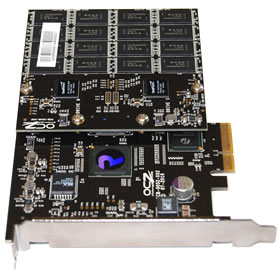How We Test, System Specs
Core i7 Test System Specs
- Intel Core i7 965 Extreme Edition (LGA1366)
- x3 2GB DDR3-1333 G.Skill (CAS 9-9-9-20)
- Asus P6T Deluxe (Intel X58)
- OCZ GameXStream (700 watt)
- AData S596 Turbo 32GB
- Crucial RealSSD C300 256GB
- OCZ RevoDrive X2 240GB
- OCZ Onyx 64GB
- OCZ Vertex 120GB
- OCZ Vertex 2 40GB
- OCZ Vertex 2 Pro 100GB
- Intel X25-V 40GB
- Kingston SNV425-S2 128GB
- Samsung 470 Series 256GB
- Seagate Momentus XT 500GB
- Samsung Spinpoint F1 1TB
- Asus GeForce GTX 480 (1.5GB)
Software
- Microsoft Windows 7 Ultimate (64-bit)
- Nvidia Forceware 262.99
For comparison, we included other SSDs using different controllers, such as the SandForce SF-1200, JMicron JMF616, Intel PC29AS218A, Marvell 88SS9174, Toshiba TC58NCF618GBT, Samsung S3C29MAX01 and Indilinx Amigos. Our testing suite consists of four synthetic benchmark programs and our own file copying and load time tests. In addition to our featured storage devices, the Samsung Spinpoint F1 1TB 3.5" 7200-RPM hard drive has been included.
As you should know by now, a problem with testing SSDs is that their peak out-of-box I/O performance can diminish over time. Unlike a conventional hard drive, any write operation made to an SSD is a two-step process, first the data block must be erased and then written to. Obviously if the drive is brand new and unused there will be nothing to erase and therefore the first step can be bypassed, but this only happens once unless the drive is trimmed.
Considering this, we will test how much performance you can expect to lose from each SSD over time. We will test all drives in their clean unused state, and then run the HD Tach full benchmark several times, which fills the entire drive. This simulates heavy usage and gives us a clear indication of how performance will be affected in normal long-term use.
